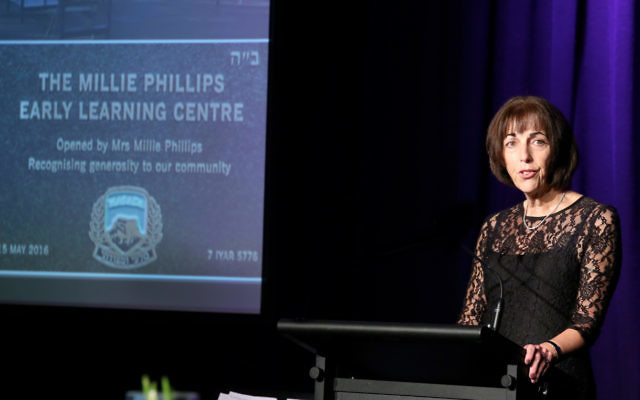Magical Masada milestone
Masada College was celebrated as being “the rock and the fortress” of Jewish life and continuity on Sydney’s north shore for 50 years at a golden jubilee gala dinner on July 16.

MASADA College was celebrated as being “the rock and the fortress” of Jewish life and continuity on Sydney’s north shore for 50 years at a golden jubilee gala dinner on July 16.
More than 340 current and past Masada parents, staff, principals, presidents and alumni – many clad in blue and gold – filled The Concourse civic pavilion in Chatswood for an evening filled with music and memories, hosted by alumni member and parent Terry Evian.
Among the audience was the college’s first president, Professor Fred Ehrlich, who told The AJN the school’s first chapter began on a very modest scale with just 14 students – including two of his – in 1966, based in a back room of the North Shore Synagogue.
Masada College quickly expanded into a flourishing primary school in Lindfield, the high school campus opened at Link Road, St Ives in the early 1980s and this year the early learning centre, primary and high schools were consolidated into the Michael Faktor campus in St Ives, where students number more than 600.
“I’m certainly overwhelmed with the scale of the place today – it’s a truly great thing to see,” Ehrlich said.
In her address, Masada College principal Wendy Barel explained the key factors behind the school’s strong record of success spanning half-a-century. “It is the love and dedication, the vision that was shared by so many families from the beginning and the shaping of that vision, with a passion, by so many staff, parents, students and board members,” Barel said.
“We can see it in the room tonight, we can see it in the number of current staff, 33, who have stayed on at the college for a minimum of 10 years – some for 20, a few for 30 and, for Cherrie Cully, a record 32 years [and counting].
“We can see it in the number of staff members – currently 13 – who are Masada alumni. And we can see it in the number of alumni who are returning to Masada as parents, with an impressive 79 children at the school reflecting on this story.
“Masada has also been the starting point for many relationships that led to marriage, and the college has provided us with so many wonderful recollections and memories.”
The college’s current president David Guth – who has four children attending the school and a fifth due to begin next year – acknowledged and thanked all those who have made Masada what it is today.
“Tonight is about you – it’s about connecting and reconnecting,” Guth said.
“Masada is a school that continues to excel in so many areas. We have established ourselves as one of the top-performing schools in the state and we are leading the way in new educational philosophies such as the Culture of Thinking and the Leader in Me programs.
“Please be our ambassadors and continue to promote the school that has played such a strong role in your life.
“Help us shape our future and be part of the next 50 years in the book of Masada College.”
JCA CEO Stephen Chipkin said Masada College is deservedly an important and direct beneficiary of JCA’s annual fundraising and, as the only Jewish day school on the north shore, its contribution to the vibrancy and diversity of local Jewish life “cannot be underestimated”.
“Masada is much more than a school – it’s a place of nurture, where excellent education is just one part,” Chipkin said.
“Its inclusive and pluralistic ethos has helped create a community.
“Some 1,800 HSC students have graduated from the college over the years.
“They built lifelong friendships with peers as you would expect, but they also built lifelong connections with their teachers – and that says something about the people, the place and the culture.”
SHANE DESIATNIK

comments